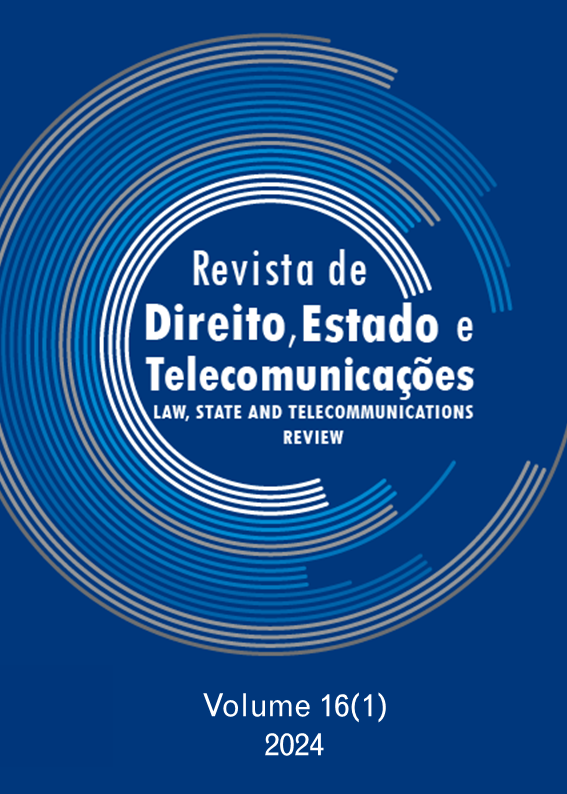Artificial Intelligence and (Im)partiality in Judicial Decisions
DOI:
https://doi.org/10.26512/lstr.v16i1.46622Keywords:
Artificial Inteligence. Discourse. Law. Imparciality. Judicial Decisions.Abstract
[Purpose] The paper aims to understand the relationship between Artificial Intelligence, Law and Discourse (namely, the one used in judicial decisions). To then analyze how the interference of Artificial Intelligence in judicial decisions can guarantee impartiality and if that interference should be the intention.
[Methodology/Approach/Design] For this purpose, a theoretical reflection was carried out around the central concepts: Law, judicial decisions, impartiality, and artificial intelligence. For this, bibliographical research was carried out.
[Findings] Artificial Intelligence (AI) is a current reality. A tautology that has been repeated so that individuals do not forget the challenges they face as a result. Thus, the courts, the judicial professions, and the law, are being confronted with this “new” reality, whether in a challenge format or from the perspective of the facilities that AI brings coupled. It remains to be seen, then, what will be the principles of law. If AI will interfere in judicial decision-making (as has already been tested), what will become of the principle of impartiality? And is this a principle that is intended to be maintained or even currently exists? The article goes through all these corners: the intertwining between discourse, law and AI; impartiality and AI as a decision-maker.
References
Amado, J. L. (2021). Inteligência Artificial, Plataformas Digitais e Robotização: que futuro para o (direito do) trabalho humano?. Revista do Tribunal Regional do Trabalho da 3.ª Região, 67(104), 239–265.
Baker, J. (2018). 2018 A Legal Research Odyssey: Artificial Intelligence as Disruptor. SSRN Electronic Journal, 110(1).
Baptista, B. G. L. (2014). “A minha verdade é minha justiça” - dilemas e paradoxos sobre o princípio da imparcialidade judicial”. Cadernos de Campo (São Paulo - 1991), 22(22), 301–314.
Castells, M., et al. (2007). Comunicação Móvel e Sociedade. Uma perspectiva global. Lisboa: Fundação Calouste Gulbenkian.
CEPEJ. (2018a). Carta Europeia de Ética sobre o Uso da Inteligência Artificial em Sistemas Judiciais e seu ambiente. Estrasburgo: CEPEJ.
CEPEJ. (2018b). CEPEJ European Ethical Charter on the use of artificial intelligence (AI) in judicial systems and their environment. Estrasbrugo: CEPEJ.
Comissão Europeia. (2020). Livro Branco sobre a inteligência artificial - Uma abordagem europeia virada para a excelência e a confiança. Bruxelas: CE.
Cunha, G. B. R. (2022). Tribunais (arbitrais) avant-garde: do juiz humano ao juiz robot. Fonseca, I. C. M. (Coord.). Resolução Alternativa de Litígios Jurídico-Públicos: Novas sobre a Mediação, a Conciliação e a Arbitragem Administrativas. Coimbra: Edições Almedina, 217–241.
Errejón Galván, Í. (2011). ¿Qué es el análisis político? Una propuesta desde la teoría del discurso y la hegemonia”. Revista Estudiantil Latinoamericana de Ciencias Sociales, 1(1), 1–16.
Fairclough, N. (2001). Discurso e mudança social. Brasília: Editora Universidade de Brasil.
Hart, H. L. A. (2011). O Conceito de Direito. Lisboa: Fundação Calouste Gulbenkian.
Kant, I. (1907). Fundamental Principles of the Metaphysics of Ethics. Editado por T. K. Abbott. Cincinnati: University of Cincinnati.
Lopes, D. S. (2021). Justiça em Curso. Preceitos e práticas da primeira instância. Porto: Edições Afrontamento.
Maia Filho, M. S. e Junquilho, T. A. (2018). Projeto Victor: perspectivas de aplicação da inteligência artificial ao direito. Revista de Direitos e Garantias Fundamentais, 19(3), 218–237.
Maquiavel, N. (2015 [1516]). O Príncipe. Lisboa: Bertrand Editora.
Medeiros, L. F. (2018). Inteligência Artificial aplicada: uma abordagem introdutória. Curitiba: Editora InterSaberes.
Menna Barreto, R. M. (2014). Ensino jurídico hoje: pistas para uma superação do “Senso Comum Teórico Jurídico” [SCTJ]. Julgar online, pp. 1–20.
Menna Barreto, R. M. (2021). Estudos críticos do discurso jurídico. São Paulo: Pontes Editores.
Menna Barreto, R. M. e Simioni, R. L. (2017). Introdução às teorias sistêmicas do direito. Braga: Associação de Estudantes de Direito da Universidade do Minho.
Nunes, D. e Marques, A. L. P. C. (2018). Inteligência artificial e direito processual: vieses algorítmicos e os riscos de atribuição de função decisória às máquinas. Revista dos Tribunais Online, 285, 421–47.
OCDE. (2019). Artificial Intelligence & Responsible Business Conduct. Paris: OECD Publishing.
OCDE. (2020). Justice Transformation in Portugal: Building on Successes and Challenges. Paris: OECD Publishing.
Robledo, D. (2022). Proceso Judicial y Inteligencia Artificial. Revista Eletrônica de Direito Processual, 23(3), 48–71.
Sen, A. (2012). A Ideia de Justiça. Coimbra: Edições Almedina.
Smith, A. (2004 [1759]). The Theory of Moral Sentiments. Editado por K. Ameriks e D. M. Clarke. United Kingdom: Cambridge University Press.
Susskind, R. (2017). Tomorrow’s Lawyers. An Introduction to Your Future. Oxford: Oxford University Press.
Susskind, R. (2019). Online Courts and the Future of Justice. Oxford: Oxford University Press.
Tacca, A. e Rocha, L. S. (2018). Inteligência Artificial: Reflexos no Sistema do Direito. Revista Nomos, 38(2), 53–68.
Teixeira, J. F. (1990). O que é a Inteligência Artificial? São Paulo: Editora Brasiliense.
Warat, L. A. (1982). Saber Crítico e Senso Comum Teórico dos Juristas. Sequência – Estudos Políticos e Jurídicos, 3(5), 48–57.
Downloads
Published
Issue
Section
License
Copyright (c) 2024 Law, State and Telecommunications Review

This work is licensed under a Creative Commons Attribution 4.0 International License.
By submitting this paper to the Law, State and Telecommunications Review,
I hereby declare that I agree to the terms of the Creative Commons Attribution 4.0 International (CC BY 4.0).


